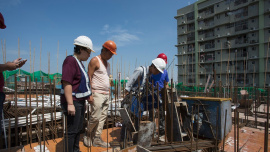Mong Ha is a busy neighbourhood of Macau. It is also an old, nearly mythical one, said to be the location of one of the first establishments of Chinese people in the peninsula, at a time when it was not properly a city yet, prior to the arrival of the Portuguese in the sixteenth century.
Its different urban and architectural layers bear witness to its long and yet dynamic history. It has a thriving social and economic life, and a life for the after-death. Temples, cemeteries and mortuary houses find their way within the urban fabric with the living.
Evolving around the hill, which carries the eponymous name, the district is surrounded by diverse remnants of Macau’s history. On the southern base of the hill, facing the main city, several ancient houses emerge here and there, telling the story of a town that belongs to the past. On the northern base, connected to the Areia Preta district and facing China, Mong Ha gives in to another type of human and urban density – where trades, crafts, and businesses form an active commercial and industrial quarter. On one side and the other, two different populations more or less converge: the Macau people, to the south, and the Mainland Chinese, to the north. Mong Ha has, thus, the particularity of being both a transitional space and a cultural midway between the local and the local to be, one day.
Though the district has immense character, politics have not accomplished much in the last few years to ascribe to it proper value within the larger cultural geography of Macau. In fact, although one of the last endeavours by the Cultural Affairs Bureau, still under Guilherme Ung Vai Meng’s direction, was to list a couple of sites in the area – the dog kennel being one of them – Mong Ha has been on the map rather due to contestation over some of its old houses. Initially earmarked for renovation, they were withdrawn from the urban planning programme, with no reasonable explanation given, followed by silence on the part of public authorities.
But residents are alert. For one, the Ox Warehouse keeps busy with cultural and artistic activities that engage people living in the area. Last week students from the Heritage Management programme at the Institute for Tourism Studies presented their graduation work focused on Mong Ha. “Reconnecting” the neighbourhood was their main call in the project. It may as well be time to reconsider.























